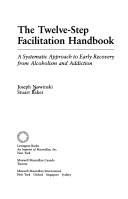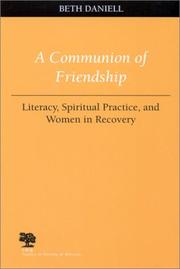| Listing 1 - 10 of 57 | << page >> |
Sort by
|
Book
ISBN: 9780813936543 0813936543 9780813936529 0813936527 9780813936536 0813936535 Year: 2014 Publisher: Charlottesville
Abstract | Keywords | Export | Availability | Bookmark
 Loading...
Loading...Choose an application
- Reference Manager
- EndNote
- RefWorks (Direct export to RefWorks)
Perhaps most important, the book is conceived for those involved in Twelve Step programs whose lives are being transformed by the experience.
Religion --- Twelve-step programs --- Philosophy. --- Religious aspects.
Book
ISBN: 9780071818919 Year: 2014 Publisher: New York (N.Y.) McGraw-Hill
Abstract | Keywords | Export | Availability | Bookmark
 Loading...
Loading...Choose an application
- Reference Manager
- EndNote
- RefWorks (Direct export to RefWorks)

ISBN: 0029232252 Year: 1992 Publisher: New York Toronto New York Lexington Books Maxwell Macmillan Canada Maxwell Macmillan International
Abstract | Keywords | Export | Availability | Bookmark
 Loading...
Loading...Choose an application
- Reference Manager
- EndNote
- RefWorks (Direct export to RefWorks)
Programma's met twaalf stappen --- Programmes à douze étapes --- Twelve-step programs --- Alcoholics --- Rehabilitation --- Narcotic addicts --- Twelve-step programs. --- Narcotics addicts - Rehabilitation.
Book
ISBN: 1282413155 9786612413155 144381198X 9781443811156 1443811157 9781443811989 Year: 2009 Publisher: Newcastle Cambridge Scholars
Abstract | Keywords | Export | Availability | Bookmark
 Loading...
Loading...Choose an application
- Reference Manager
- EndNote
- RefWorks (Direct export to RefWorks)
The Anonymous Society is an in-depth anthropological study conducted in Portugal among the 12-Step associations Alcoholics Anonymous, Families Anonymous and Narcotics Anonymous.
Twelve-step programs --- Programs, Twelve-step --- Steps, Twelve (Self-help) --- Twelve steps (Self-help) --- Self-help techniques --- Evaluation. --- Social aspects. --- Psychological aspects.
Book
ISBN: 1283701332 1849899282 1849899274 9781849899284 9781908354099 1908354097 9781908354082 1908354089 9781849899277 Year: 2011 Publisher: Luton Andrews UK
Abstract | Keywords | Export | Availability | Bookmark
 Loading...
Loading...Choose an application
- Reference Manager
- EndNote
- RefWorks (Direct export to RefWorks)
Alcoholism. --- Alcoholics --- Twelve-step programs. --- Substance abuse --- Rehabilitation. --- Treatment. --- Shepley, Nick.
Book
ISBN: 9781419550508 Year: 2013 Publisher: New York (N.Y.) Kaplan
Abstract | Keywords | Export | Availability | Bookmark
 Loading...
Loading...Choose an application
- Reference Manager
- EndNote
- RefWorks (Direct export to RefWorks)
Book
ISBN: 0520969561 9780520969568 9780520297043 0520297040 9780520297043 9780520297050 0520297059 9780520297050 Year: 2019 Publisher: Oakland, California
Abstract | Keywords | Export | Availability | Bookmark
 Loading...
Loading...Choose an application
- Reference Manager
- EndNote
- RefWorks (Direct export to RefWorks)
Understanding Criminal Networks is a short methodological primer for those interested in studying illicit, deviant, covert, or criminal networks using social network analysis (SNA). Accessibly written by Gisela Bichler, a leading expert in SNA for dark networks, the book is chock-full of graphics, checklists, software tips, step-by-step guidance, and straightforward advice. Covering all the essentials, each chapter highlights three themes: the theoretical basis of networked criminology, methodological issues and useful analytic tools, and producing professional analysis. Unlike any other book on the market, the book combines conceptual and empirical work with advice on designing networking studies, collecting data, and analysis. Relevant, practical, theoretical, and methodologically innovative, Understanding Criminal Networks promises to jumpstart readers' understanding of how to cross over from conventional investigations of crime to the study of criminal networks.
Criminology --- Methodology. --- analytic tools. --- checklists. --- conventional investigations. --- covert networks. --- criminal investigations. --- criminal networks. --- deviant networks. --- graphics. --- illicit networks. --- methodological issues. --- networked criminology. --- producing professional analysis. --- social network analysis. --- software tips. --- step by step guidance. --- straightforward advice. --- theoretical basis.
Book
ISBN: 0773550615 0773550607 9780773550605 9780773550612 9780773550599 0773550593 Year: 2017 Publisher: Montreal Kingston London Chicago
Abstract | Keywords | Export | Availability | Bookmark
 Loading...
Loading...Choose an application
- Reference Manager
- EndNote
- RefWorks (Direct export to RefWorks)
The step-dancing of the Scotch Gaels in Nova Scotia is the last living example of a form of dance that waned following the great emigrations to Canada that ended in 1845. The Scotch Gael has been reported as loving dance, but step-dancing in Scotland had all but disappeared by 1945. One must look to Gaelic Nova Scotia, Cape Breton, and Antigonish County, to find this tradition. Gaelic Cape Breton Step-Dancing, the first study of its kind, gives this art form and the people and culture associated with it the prominence they have long deserved. Gaelic Scotland’s cultural record is by and large pre-literate, and references to dance have had to be sought in Gaelic songs, many of which were transcribed on paper by those who knew their culture might be lost with the decline of their language. The improved Scottish culture depended proudly on the teaching of dancing and the literate learning and transmission of music in accompaniment. Relying on fieldwork in Nova Scotia, and on mentions of dance in Gaelic song and verse in Scotland and Nova Scotia, John Gibson traces the historical roots of step-dancing, particularly the older forms of dancing originating in the Gaelic–speaking Scottish Highlands. He also places the current tradition as a development and part of the much larger British and European percussive dance tradition. With insight collected through written sources, tales, songs, manuscripts, book references, interviews, and conversations, Gaelic Cape Breton Step-Dancing brings an important aspect of Gaelic history to the forefront of cultural debate.
Step dancing --- Dance --- History. --- Cape Breton Island (N.S.) --- Scotland --- Cape Breton Island, N.S. --- Social life and customs.
Book
ISBN: 1783741422 1783741449 9781783741441 9781783741458 9781783741465 1783741457 Year: 2016 Publisher: Open Book Publishers
Abstract | Keywords | Export | Availability | Bookmark
 Loading...
Loading...Choose an application
- Reference Manager
- EndNote
- RefWorks (Direct export to RefWorks)
This book is intended to help candidates prepare for entrance examinations in mathematics and scientific subjects, including STEP (Sixth Term Examination Paper). STEP is an examination used by Cambridge colleges as the basis for conditional offers. They are also used by Warwick University, and many other mathematics departments recommend that their applicants practice on the past papers even if they do not take the examination. Advanced Problems in Mathematics is recommended as preparation for any undergraduate mathematics course, even for students who do not plan to take the Sixth Term Examination Paper. The questions analysed in this book are all based on recent STEP questions selected to address the syllabus for Papers I and II, which is the A-level core (i.e. C1 to C4) with a few additions. Each question is followed by a comment and a full solution. The comments direct the reader’s attention to key points and put the question in its true mathematical context. The solutions point students to the methodology required to address advanced mathematical problems critically and independently. This book is a must read for any student wishing to apply to scientific subjects at university level and for anybody interested in advanced mathematics.
Mathematics --- Calculus --- Geometry --- Study and teaching (Higher) --- Math --- Science --- geometry --- calculus --- probability and statistics --- undergraduate mathematics course --- step examinations --- advanced mathematical problems --- Imaginary unit --- Stationary point --- Trigonometric functions

ISBN: 9780809388882 080938888X 0809324873 9780809324873 Year: 2003 Publisher: Carbondale Southern Illinois University Press
Abstract | Keywords | Export | Availability | Bookmark
 Loading...
Loading...Choose an application
- Reference Manager
- EndNote
- RefWorks (Direct export to RefWorks)
Drawing on interviews and an array of scholarly work, Beth Daniell maps out the relations of literacy and spirituality in A Communion of Friendship: Literacy, Spiritual Practice, and Women in Recovery. Daniell tells the story of a group of women in "Mountain City" who use reading and writing in their search for spiritual growth. Diverse in socioeconomic status, the Mountain City women are, or have been, married to alcoholics. In Al-Anon, they use literacy to practice the Twelve Steps of Alcoholics Anonymous in order to find spiritual solutions to their problems. In addition, Daniell demonstr
Spiritual life. --- Literacy --- Narrative therapy. --- Adult education --- Female friendship --- Women --- Twelve-step programs --- English language --- Life, Spiritual --- Religious life --- Spirituality --- Storytelling --- Psychotherapy --- Friendship between women --- Friendship in women --- Women's friendship --- Friendship --- Programs, Twelve-step --- Steps, Twelve (Self-help) --- Twelve steps (Self-help) --- Self-help techniques --- Education --- Rhetoric --- Study and teaching --- Therapeutic use --- Germanic languages
| Listing 1 - 10 of 57 | << page >> |
Sort by
|

 Search
Search Feedback
Feedback About UniCat
About UniCat  Help
Help News
News